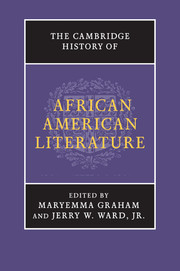Book contents
- Frontmatter
- Introduction
- PART I AFRICAN AMERICAN LITERATURE FROM ITS ORIGINS TO THE TWENTIETH CENTURY
- 1 Sounds of a tradition: the souls of black folk
- 2 Early print literature of Africans in America
- 3 The emergence of an African American literary canon, 1760–1820
- 4 Dividing a nation, uniting a people: African American literature and the abolitionist movement
- 5 African American literature and the abolitionist movement, 1845 to the Civil War
- 6 Writing freedom: race, religion, and revolution, 1820–1840
- 7 “We wish to Plead our own Cause”: independent antebellum African American literature, 1840–1865
- 8 Racial ideologies in theory and practice: political and cultural nationalism, 1865–1910
- 9 The “fictions” of race
- 10 “We Wear the Mask”: the making of a poet
- 11 Toward a modernist poetics
- PART II AFRICAN AMERICAN LITERATURE IN THE TWENTIETH CENTURY
- PART III AFRICAN AMERICAN LITERATURE AS ACADEMIC AND CULTURAL CAPITAL
- Bibliography
- Index
- References
3 - The emergence of an African American literary canon, 1760–1820
from PART I - AFRICAN AMERICAN LITERATURE FROM ITS ORIGINS TO THE TWENTIETH CENTURY
Published online by Cambridge University Press: 28 May 2011
- Frontmatter
- Introduction
- PART I AFRICAN AMERICAN LITERATURE FROM ITS ORIGINS TO THE TWENTIETH CENTURY
- 1 Sounds of a tradition: the souls of black folk
- 2 Early print literature of Africans in America
- 3 The emergence of an African American literary canon, 1760–1820
- 4 Dividing a nation, uniting a people: African American literature and the abolitionist movement
- 5 African American literature and the abolitionist movement, 1845 to the Civil War
- 6 Writing freedom: race, religion, and revolution, 1820–1840
- 7 “We wish to Plead our own Cause”: independent antebellum African American literature, 1840–1865
- 8 Racial ideologies in theory and practice: political and cultural nationalism, 1865–1910
- 9 The “fictions” of race
- 10 “We Wear the Mask”: the making of a poet
- 11 Toward a modernist poetics
- PART II AFRICAN AMERICAN LITERATURE IN THE TWENTIETH CENTURY
- PART III AFRICAN AMERICAN LITERATURE AS ACADEMIC AND CULTURAL CAPITAL
- Bibliography
- Index
- References
Summary
The sixty years of African American literary history between 1760, when works authored by people of African descent were first published, and the Missouri Compromise in 1820, when the institution of slavery was officially recognized as fundamental to the United States, fall into three periods. The first, from 1760 to the early 1770s, was marked by the evolution and establishment of a transatlantic black identity that transcended national and geographical boundaries, an identity that persists. During the second period, between the Declaration of Independence in 1776 and the abolition of the transatlantic slave trade in 1808, an American identity increasingly seemed available to people of African descent residing in the new United States. That expectation appeared to be dashed after 1808, as the political and social victories achieved during the first emancipation were rolled back, making emigration from the United States to Africa a subject of public controversy.
When the earliest texts of what we now recognize as the African American literary canon first appeared, however, they were rarely seen as either African or American. Furthermore, few such texts were considered literary, in the sense of being works whose form and style were intended to be at least as significant as their content. Many of the early autobiographical texts were authored though not written by their subjects. These as-told-to narratives are accounts by blacks recorded by white amanuenses. Hence, the following brief overview of the period from 1760 to 1820 often refers to authors rather than writers, and frequently to texts or writings rather than literature.
- Type
- Chapter
- Information
- The Cambridge History of African American Literature , pp. 52 - 65Publisher: Cambridge University PressPrint publication year: 2011
References
- 1
- Cited by



